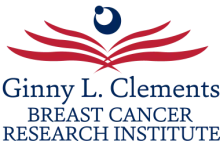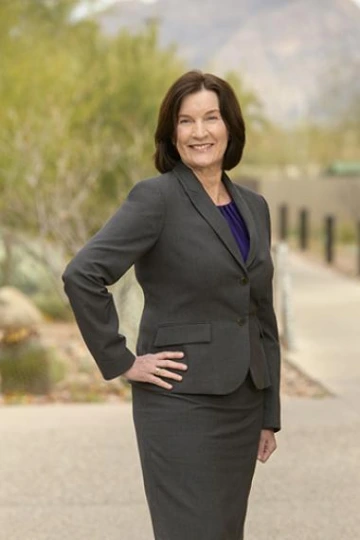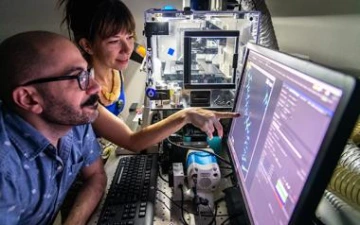
Translating Discovery
Innovative Supportive Care Encourages Holistic Well-Being

Dr. Terry Badger's development of telehealth interventions enables supportive care for patients in the most remote areas of the state, and is an invaluable aid, especially to underserved populations.
Some of the most exciting work being done at the Ginny L. Clements Breast Cancer Research Institute is now having a positive impact in the lives of cancer patients and their caregivers. The research of Terry Badger, PhD provides one example of this. Dr. Badger’s work makes use of supportive care interventions to help patients better cope with their symptoms, which is known to be a key piece in survivorship and maintaining quality of life while being treated for breast cancer.
“We’ve developed very effective supportive care interventions that have worked for thousands of cancer patients and their caregivers to manage their symptoms and reduce psychological distress.” Badger’s supportive care is delivered to patients and caregivers by phone, and this innovation predates the telehealth trends that came with the COVID-19 pandemic. Badger said that these interventions cater specifically to the needs of the Cancer Center’s catchment area.
“Everything we do can be done in both English and Spanish,” Badger said. “And we can provide this service to people in rural areas. The majority of participants report very positive experiences associated with this kind of supportive care.”
Taking Scientific Discovery to the Next Level
Game-changing basic scientific research at the Ginny L. Clements Breast Cancer Research Institute is presenting researchers with opportunities to collaborate and translate discovery into innovation. Cancer Center member, Ghassan Mouneimne, PhD, has discovered that breast cancer cells become more aggressive when they encounter tissue stiffening. This discovery and collaboration with fellow Cancer Center member, Casey E. Romanoski, PhD, has led to the development of a “MeCo Score” which measures tissue stiffness and may one day be used as a predictor for best, individualized intervention strategies for breast cancer patients. “Unfortunately, bone metastasis is normally not identified until an advanced state when it’s not reversible,” Dr. Mouneimne, said.
“What’s really exciting is one day being able to take a sample from the patient’s primary tumor and predict who is at high risk for bone metastasis. Then we could intervene with a prevention strategy that we are now validating in the lab.”

Ghassan Mouneimne, PhD, hopes the findings of a recently concluded study will lead to a way to predict which breast cancer patients are at high risk for bone metastasis.
To further explore the clinical application, Dr. Mouneimne and Adam Watson, PhD, a former graduate student and postdoctoral fellow at the UArizona Cancer Center, worked with Tech Launch Arizona, the office of the university that commercializes inventions stemming from research, to launch a startup, MeCo Diagnostics, LLC. The company is working toward maturing the technology and bringing it to the marketplace where it can impact the lives of breast cancer patients everywhere.
It was previously known that tumor stiffness induces cellular changes that lead to a more aggressive cancer, but according to Dr. Watson, lead author on the paper, the concept of “stiffness” was misleading.
“Most early-stage breast tumors are stiffer than surrounding tissue, yet most don’t spread to bone,” he said. “It’s not about tumor stiffness but rather stiffness responsiveness of the cancer cells, which we call mechanical conditioning.”
To study this phenomenon, the team created a laboratory environment that mimicked the stiff or soft tumor environments encountered in the body and assessed how breast cancer cells responded. They found that cells grown in a stiff environment had a “mechanoresponse” characterized by cell spreading, invasion and turning on genes linked with both bone development and disease. And these gene changes endured even after the cells were moved to a soft environment.
Next, researchers looked at what genes were turned on and off in breast cancer cells in response to the stiff environments. Based on these gene expression changes, they developed the MeCo score, which was validated and refined using data from thousands of patients with breast cancer.
“This is the culmination of a lot of work by researchers from many different fields,” Dr. Mouneimne said. “It highlights the environment we have at the University of Arizona Health Sciences, and how working together can make progress in this challenging area of breast cancer metastasis.”



